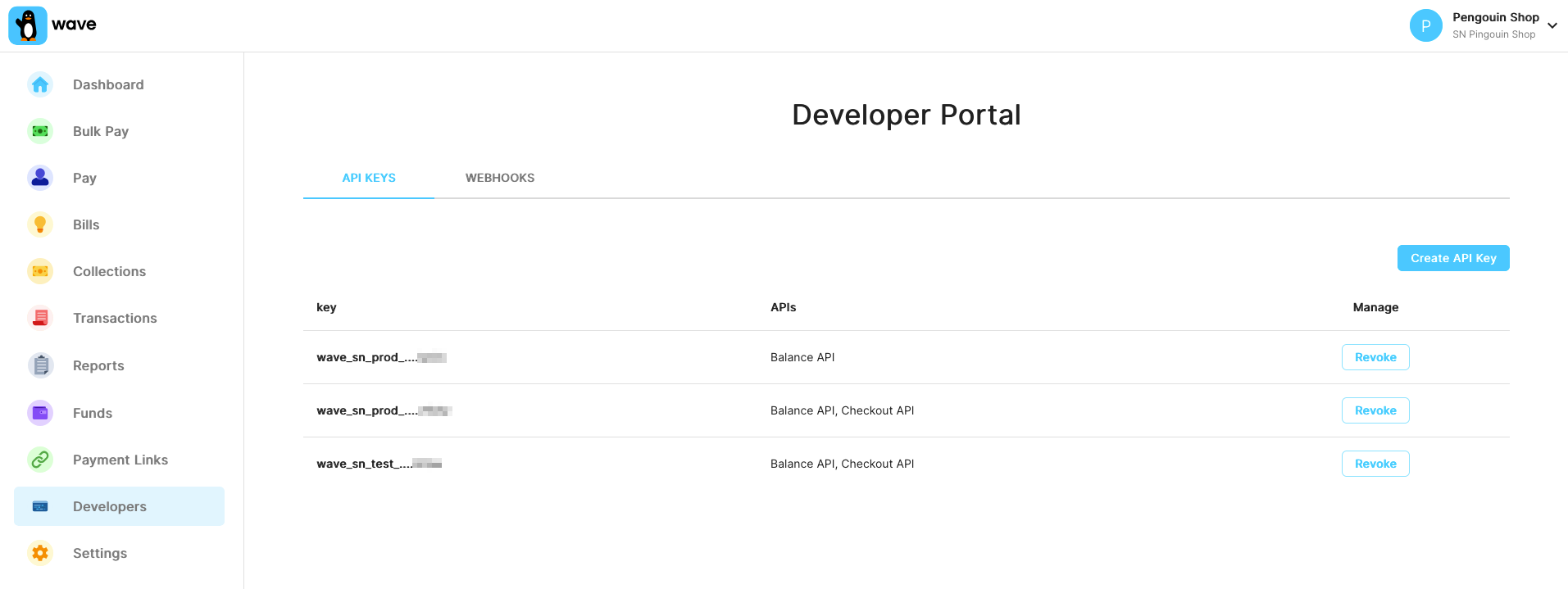API Reference
Wave Business APIs provide a programmatic means to work with your Wave business account. By using these REST APIs you can receive payments, send money to your clients, check the balance on your wallet and perform automated reconciliation.
To use these APIs, you need a Wave Business Account.
Base URL
All the endpoint paths referenced in the API document are relative to a base URL, https://api.wave.com.
Authentication
Authenticating to the API is done via API keys. These keys are bound to a single business wallet and can only interact with it.
If you need to interact with more than one wallet in your network, then you will have to obtain one key per wallet.
Each request must be sent over HTTPS and contain an authorization header specifying the bearer scheme with the api key:
Authorization: Bearer wave_sn_prod_YhUNb9d...i4bA6
Note that the actual key is much longer but for documentation purposes most of the characters have been replaced by an ellipses.
Obtaining your API key
You can manage API keys in the developer's section in the Wave Business Portal. You can create, view, and revoke keys, and define which specific APIs each key has access to.

When you create a new API key, you will only see the full key once. Make sure you copy it without missing any characters, since it will be masked afterwards for security reasons.

Wave doesn't know your full key, but if you contact API support we can identify them by the last 4 letters that you see displayed in the business portal.
Error codes
In the authentication phase, one of the following errors can cause your request to return early:
| Status | Code | Descriptions |
|---|---|---|
| 401 | missing-auth-header |
Your request should include an HTTP auth header. |
| 401 | invalid-auth |
Your HTTP auth header can't be processed. |
| 401 | api-key-not-provided |
Your request should include an API key. |
| 401 | no-matching-api-key |
The key you provided doesn't exist in our system. |
| 401 | api-key-revoked |
Your API key has been revoked. |
| 403 | invalid-wallet |
Your wallet can't be used in this particular API. |
| 403 | disabled-wallet |
Your wallet has been temporarily disabled. You should still be able to use the endpoint to check your balance. |
Rate limiting
Wave APIs are rate limited to prevent abuse that would degrade performance for all users. If you send many requests in a short period of time, you may receive 429 error responses.
Requests
Here's an example of how you can construct a POST request with
AuthorizationandContent-Typeheaders and JSON data:
curl \
-X POST \
-H 'Authorization: Bearer wave_sn_prod_YhUNb9d...i4bA6' \
-H 'Content-Type: application/json' \
-d '{
"amount": "1000",
"currency": "XOF",
"error_url": "https://example.com/error",
"success_url": "https://example.com/success"
}' \
https://api.wave.com/v1/checkout/sessions
const axios = require('axios');
axios.post('https://api.wave.com/v1/checkout/sessions', {
amount: "1000",
currency: "XOF",
error_url: "https://example.com/error",
success_url: "https://example.com/success"
}, {
headers: {
'Authorization': 'Bearer wave_sn_prod_YhUNb9d...i4bA6',
'Content-Type': 'application/json'
}
})
.then(response => {
console.log(response.data);
})
.catch(error => {
console.error(error);
});
$curl = curl_init();
curl_setopt_array($curl, [
CURLOPT_URL => "https://api.wave.com/v1/checkout/sessions",
CURLOPT_RETURNTRANSFER => true,
CURLOPT_ENCODING => "",
CURLOPT_MAXREDIRS => 10,
CURLOPT_TIMEOUT => 0,
CURLOPT_FOLLOWLOCATION => true,
CURLOPT_HTTP_VERSION => CURL_HTTP_VERSION_1_1,
CURLOPT_CUSTOMREQUEST => "POST",
CURLOPT_POSTFIELDS => json_encode([
"amount" => "1000",
"currency" => "XOF",
"error_url" => "https://example.com/error",
"success_url" => "https://example.com/success"
]),
CURLOPT_HTTPHEADER => [
"Authorization: Bearer wave_sn_prod_YhUNb9d...i4bA6",
"Content-Type: application/json"
],
]);
$response = curl_exec($curl);
curl_close($curl);
echo $response;
import okhttp3.*;
import org.json.JSONObject;
public class Main {
public static void main(String[] args) {
OkHttpClient client = new OkHttpClient().newBuilder().build();
MediaType mediaType = MediaType.parse("application/json");
RequestBody body = RequestBody.create(mediaType, new JSONObject()
.put("amount", "1000")
.put("currency", "XOF")
.put("error_url", "https://example.com/error")
.put("success_url", "https://example.com/success")
.toString());
Request request = new Request.Builder()
.url("https://api.wave.com/v1/checkout/sessions")
.method("POST", body)
.addHeader("Authorization", "Bearer wave_sn_prod_YhUNb9d...i4bA6")
.addHeader("Content-Type", "application/json")
.build();
try {
Response response = client.newCall(request).execute();
System.out.println(response.body().string());
} catch (Exception e) {
e.printStackTrace();
}
}
}
Wave API requests use HTTP bearer authorization and, for those with a body, JSON format and UTF-8 encoding. All requests should be sent with HTTPS.
Methods
Wave API requests use the HTTP GET or POST methods.
The GET method is used to retrieve resources. GET requests are idempotent and will not change any data on the server.
The POST method is used to create new resources.
Headers
For authentication, the Authorization header must be included in the request. The value consists of the auth scheme, Bearer followed by the api key:
Authorization: Bearer <API key>
For requests which include a body, the Content-Type header must specify that the body is JSON:
Content-Type: application/json
Body
Some Wave API requests include data. That data must be in JSON format and use UTF-8 encoding.
Responses
Wave API responses use HTTP status codes to indicate whether a request has been completed successfully. 2xx codes indicate that the request was successful received, understood and accepted. 4xx codes signal a problem with the request from the client and 5xx codes indicate a problem on the server end. See Errors for more information about error responses.
For a response to a successful API request, the message body contains information provided by the server in JSON format (using UTF-8 encoding).
For a response to an unsuccessful request, the message body includes details about the error in JSON format (using UTF-8 encoding). Minimally, this includes a short error code and a longer user-readable message describing the reason for the failure.
Errors
When an API request cannot be completed successfully, the response provides information about the failure in the message body and in the HTTP status code.
Error details
Here's what the message body of a response to an invalid request might look like:
{
"code": "request-validation-error",
"message": "Request invalid",
"details": [{
"loc": ["payments", 1, "mobile"],
"msg": "field required"
}]
}
In response to unsuccessful requests, Wave provides details about the error in the message body. This includes, minimally, a short code and longer user-readable message describing the error. For validation errors, Wave may also provide details of what failed including the field that failed validation and the problem with it.
Status codes
The general reason for the failure is reflected in the HTTP response status code. 4xx codes signal a problem with the request from the client and 5xx codes indicate a problem on the server end. Specific details of the problem are provided in the message body.
Some of the status codes we return are listed below.
| Code | Title | Descriptions |
|---|---|---|
| 400 | Bad Request | The server cannot process the request because it is badly formed. |
| 401 | Unauthorized | The API key is invalid. |
| 403 | Forbidden | The API key doesn't have appropriate permissions for the request. |
| 404 | Not Found | You requested an object or page that could not be found. |
| 422 | Unprocessable Entity | The request is properly formed but the server is unable to process the contents. |
| 429 | Too Many Requests | The rate limit was exceeded i.e. the server received too many requests in a given period of time. |
| 500 | Internal Server Error | The server encountered an error. Try again later. |
| 503 | Service Unavailable | The server is unable to handle the request due to a temporary overload or scheduled maintenance. Try again later. |
Changelog
2024-03-29
Removes override_business_name details from the Checkout API
2022-10-17
Added aggregated_merchant_id details to the Checkout API.
2022-05-10
The Checkout API now validates decimal places following the rules described in the Amount section.
2022-03-29
Adds override_business_name details to Checkout API
2022-03-23
Initial release of Checkout and Balance APIs.

